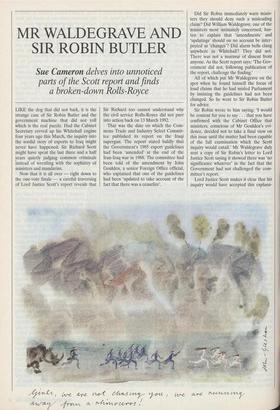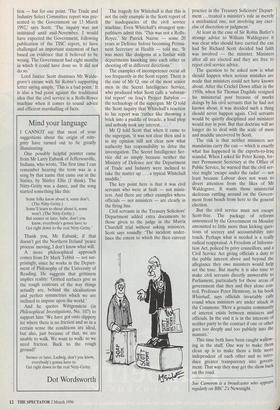MR WALDEGRAVE AND SIR ROBIN BUTLER
Sue Cameron delves into unnoticed parts of the Scott report and finds a broken-down Rolls-Royce LIKE the dog that did not bark, it is the strange case of Sir Robin Butler and the government machine that did not roll which is the real puzzle. Had the Cabinet Secretary revved up his Whitehall engine four years ago this March, the inquiry into the sordid story of exports to Iraq might never have happened. Sir Richard Scott might have spent the last three and a half years quietly judging common criminals instead of wrestling with the sophistry of ministers and mandarins.
Now that it is all over — right down to the one-vote finale — a careful traversing of Lord Justice Scott's report reveals that Sir Richard too cannot understand why the civil service Rolls-Royce did not purr into action back on 13 March 1992.
That was the date on which the Com- mons Trade and Industry Select Commit- tee published its report on the Iraqi supergun. The report stated baldly that the Government's 1985 export guidelines had been 'amended' at the end of the Iran-Iraq war in 1988. The committee had been told of the amendment by John Goulden, a senior Foreign Office official, who explained that one of the guidelines had been 'updated to take account of the fact that there was a ceasefire'. Did Sir Robin immediately warn minis- ters they should deny such a misleading claim? Did William Waldegrave, one of the ministers most intimately concerned, has- ten to explain that 'amendments' and `updatings' should on no account be inter- preted as 'changes'? Did alarm bells clang anywhere in Whitehall? They did not. There was not a murmur of dissent from anyone. As the Scott report says: 'The Gov- ernment did not, following publication of the report, challenge the finding.'
All of which put Mr Waldegrave on the spot when he found himself the focus of loud claims that he had misled Parliament by insisting the guidelines had not been changed. So he went to Sir Robin Butler for advice.
Sir Robin wrote to him saying: 'I would be content for you to say . . . that you have confirmed with the Cabinet Office that ministers, conscious of Mr Goulden's evi- dence, decided not to take a final view on this issue until the matter had been capable of the full examination which the Scott inquiry would entail.' Mr Waldegrave duly sent a copy of Sir Robin's letter to Lord Justice Scott saying it showed there was 'no significance whatever' in the fact that the Government had not challenged the com- mittee's report.
Lord Justice Scott makes it clear that his inquiry would have accepted this explana- tion — but for one point. 'The Trade and Industry Select Committee report was pre- sented to the Government on 13 March 1992,' says Scott. 'The inquiry was not instituted until mid-November. I would have expected the Government, following publication of the TISC report, to have challenged an important statement of fact based on evidence that it believed to be wrong. The Government had eight months in which it could have done so. It did not do so.'
Lord Justice Scott dismisses Mr Walde- grave's excuse with Sir Robin's supporting letter saying simply, 'This is a bad point.' It is also a bad point against the traditional idea that the civil service is a Rolls-Royce machine when it comes to sound advice and efficient marshalling of facts. The tragedy for Whitehall is that this is not the only example in the Scott report of the inadequacies of the civil service machine. Even Whitehall's strongest sym- pathisers admit this. 'This was not a Rolls- Royce,' Sir Patrick Nairne — some 20 years at Defence before becoming Perma- nent Secretary at Health — told me. 'It was more like dodgems at a funfair with departments knocking into each other or shooting off in different directions.'
The examples of incompetence occur all too frequently in the Scott report. There is the case of Mr Q, one of the most senior men in the Secret Intelligence Service, who produced what Scott calls a 'substan- tial report' on Iraq's Project Babylon the technology of the supergun. Mr Q told the Scott inquiry that Whitehall's reaction to his report was 'rather like throwing a brick into a puddle of treacle, a loud plop and nobody took any interest. . . . '
Mr Q told Scott that when it came to the supergun, 'it was not clear then and is in my opinion still not clear now what authority has responsibility to drive the investigation. The Secret Intelligence Ser- vice did so simply because neither the Ministry of Defence nor the Department of Trade and Industry were inclined to take the matter up . . . a typical Whitehall muddle.'
The key point here is that it was civil servants who were at fault — not minis- ters. And there are other examples where officials — not ministers — are clearly in the firing line.
Civil servants in the Treasury Solicitors' Department added extra documents to those given to the judge in the Matrix Churchill trial without asking ministers. Scott says roundly: 'The incident under- lines the extent to which the then current practice in the Treasury Solicitors' Depart- ment ... treated a minister's role as merely a mechanical one, not involving any exer- cise of discretion or judgment.'
At least in the case of Sir Robin Butler's strange advice to William Waldegrave it was clear who should have carried the can had Sir Richard Scott decided bad faith was involved — the minister. Ministers after all are elected and they are free to reject civil service advice.
The question to be asked now is what should happen when serious mistakes are made that ministers could not have known about. After the Crichel Down affair in the 1950s, when Sir Thomas Dugdale resigned his ministerial post because of murky doings by his civil servants that he had not known about, it was decided such a thing should never happen again. Civil servants would be quietly disciplined and ministers would stay in post. But that doctrine will no longer do to deal with the scale of mess and muddle uncovered by Scott.
The risk is that neither ministers nor mandarins carry the can — which is exactly what has happened in the exports-to-Iraq scandal. When I asked Sir Peter Kemp, for- mer Permanent Secretary at the Office of Public Service, he warned that the civil ser- vice might 'escape under the radar' — not least because Labour does not want to divert attention from the likes of Mr Waldegrave. It wants those ministerial skeletons rattling around on the Govern- ment front bench from here to the general election.
But the civil service must not escape Scott-free. The package of reforms announced by the Government on Monday amounted to little more than kicking ques- tions of secrecy and accountability into touch. Perhaps what is needed is a really radical reappraisal. A Freedom of Informa- tion Act, policed by privy councillors, and a Civil Service Act giving officials a duty to the public interest above and beyond the allegiance they owe ministers would help set the tone. But maybe it is also time to make civil servants directly answerable to Parliament, particularly for those areas of government that they and they alone con- trol. Professor Peter Hennessy, in his book Whitehall, says officials invariably rally round when ministers are under attack in the Commons: 'Here a genuine community of interest exists between ministers and officials. In the end it is in the interests of neither party to the contract if one or other goes too deeply and too publicly into the manure.'
This time both have been caught wallow- ing in the stuff. One way to make them clean up is to make them a little more independent of each other and to intro- duce greater transparency into govern- ment. That way they may get the show back on the road.
Sue Cameron is a broadcaster who appears regularly on BBC 2's Newsnight.



































































 Previous page
Previous page